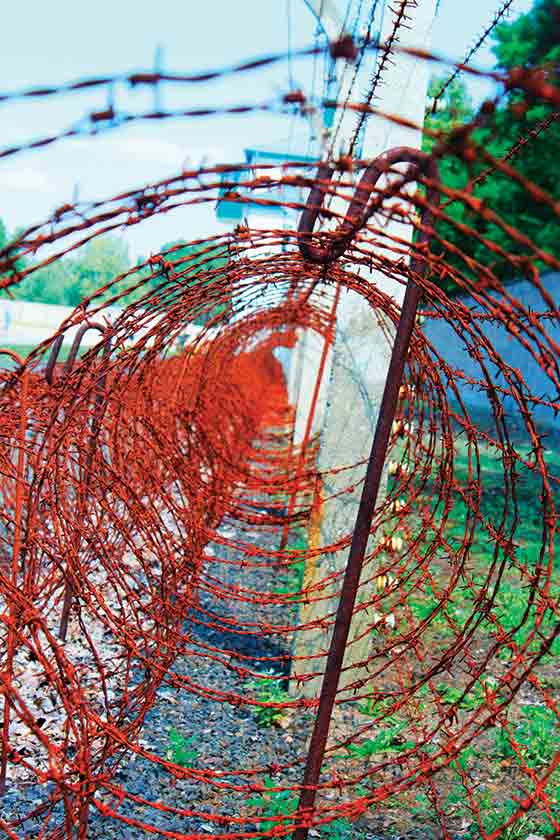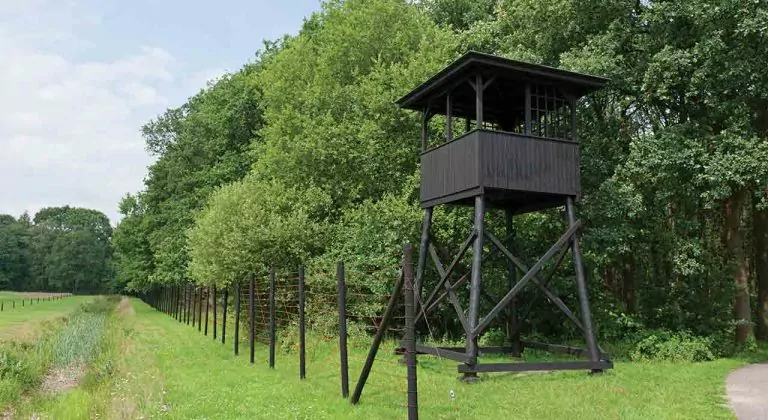This is the story of my paternal grandfather’s last year on earth. He was a man of unwavering faith despite suffering arrest, incarceration, indignity, illness, and death. He was active in the Dutch resistance movement against Nazism and encouraged fellow prisoners in the various jails and camps in which he was held. Here is the story of his resistance, arrest, incarceration, and death in the Nazi concentration camp Sachsenhausen.
This story is a reworking of a chapter (pp. 192-200) out of the book Velsen Bezet en Bevrijd (The Occupation and Liberation of Velsen) by Guus Hartendorf (used here with his permission) and published by Velserbroek, 2000, translated by the late Rienk Koat of Langley, B.C. in 2000.
Editor’s note: a version of this also appears as Chapter 3 in “Man of the First Hour,” the biography the author wrote about his father, Jules Van Popta, the first minister of the Canadian Reformed Churches. You can find out how to order it from Providence Books and Press here.
*****
In 1912 Taeke van Popta, at the age of 30, became the principal of a Christian school in IJmuiden, a port city in the Dutch province of North Holland. He soon became engaged in all manner of other activities, such as youth groups, catechism, and consistory, and was the initiator of a Christian Society for Mariners. In the classroom and at the youth clubs he gave many young people in IJmuiden a sense of self-awareness and responsibility to the Lord and the neighbor. In the providence of God this laid the groundwork for subsequent resistance work against the Germans in World War II in which he, friends, and former students would be involved.
ARRESTED
By the time the Second World War broke out, my grandfather, Taeke, was retired, yet he remained active in the field of education. He did a great amount of work for the Society of Christian Teachers in the Netherlands and Overseas, the Protestant Christian Teachers’ Society, and he was on the Executive for the Reformed School Society.
On January 9, 1942, the Nazis enacted a law in the Netherlands that prohibited the employment of Jewish personnel in all schools. Taeke had strong objections to this decree and did not hesitate to communicate this in letters to various school boards. This would be his undoing. He was arrested for the first time in the early hours of January 18, 1944. Several days later he was released and he soon after wrote about his experience:
A few weeks ago Jan Fidder, formerly secretary of the Anti Revolutionary Party [a political party supported by many Reformed people] was apprehended in IJmuiden. About a week later Mr. Geert Visser, who works at the employment office, and I were taken from our homes. At twelve midnight the doorbell rang, with police in front and at the back of the house. The house was searched and I was then taken away by the Germans. In the police van I found Geert Visser.
On the following Thursday Fidder as well as both Geert Visser, and a brother of his who had also been arrested, were released and allowed to go home. I was released on Friday.
The problem was the issue of counterfeit permits to restricted areas along the coast. Jan Fidder was suspected to be involved in this business, and then it was thought that a small group was involved, which resulted in trying to find its members among the good acquaintances of Jan Fidder. Fortunately, I had nothing to do with this. But initially one didn’t know what the meaning of all this was, and so I had expected that I would be a prisoner for quite awhile. After the hearing I thought that I would be in prison for at least half a year. So we felt we had received quite a break.
During the search in the house, the deportment of the policemen was civil. At the farewell the children saw to it that I could take along a Bible and Psalter. Next morning I started to sing in my cell, and both Jan Fidder and Geert Visser, who were in an adjacent cell, were singing along. We sang quite a few psalms and hymns, and after the meals we took turns reading from the Bible and praying. Because of the little window in the door we could understand each other quite clearly. Others, too, started to sing along to the extent of their knowledge of psalms and Christian hymns.
When Jan Fidder and Geert Visser were no longer there, the other prisoners asked me to continue reading and praying. They were prisoners who didn’t know a single psalm or hymn. I made an attempt, and it was only during “Ere zij God” [a beloved Dutch Christmas hymn] that a few could join in. But our reading and praying were much appreciated, and were listened to silently and reverently.
And so it was that we three had some blessed days there. Yet we were very glad that this affair so quickly took a turn for the better, and that we could go home again. Meanwhile I was enriched with some knowledge about life.
The fact that faith had been a support for many prisoners became clear from other conversations and published writings. Geert Visser’s brother Jur, arrested on March 1, 1945, wrote:
You ask why there were so many Reformed people active in the resistance movement? This came about because of the outstanding education they had received in catechism classes and youth societies. Church, also as a body working in society, ranked first. The school was an extension of the family. You could rely on that community. They were, mostly, dutiful Dutchmen. “Old” Van Popta, as he was respectfully nicknamed, had trained us in the youth society. Likewise by means of his articles in the church bulletins he instructed us to resist the National Socialist Party [the fascist political party in the Netherlands loyal to the German Nazis].
Taeke’s daughter-in-law, Ida, wrote:
My father-in-law was deeply involved in everything related to Christian education, but in doing so he could be rather careless. Correspondence with several school boards about the Nazi decree to lay off Jewish personnel were never properly disposed of. This was also the reason that we, my husband Wiepke and I, but also the other children, more or less forbade Father to engage in other resistance work as well. By virtue of his work he had established a huge number of acquaintances, and he well known since one half of IJmuiden had attended his school. He was, so to speak, part of the Reformed circuit.
A few months later the Germans raided Taeke’s house again. The police report of May 5, 1944, reads:
By order of the captain, chief of the police force, arrest was made of Taeke van Popta, born January 7, 1882, principal of a Christian school. Incarcerated in cell J, Tuesday, May 9, 1944, at 14:30. The arrested Van Popta was transported to the Security Police in Amsterdam, under escort of H. A. de Jager.
Apparently, the Nazis had uncovered certain written publications at a different location in the Netherlands. The documents were advisory letters and recommendations to various Christian school boards. When he was interrogated, Taeke assumed total responsibility for all the letters because otherwise the inevitable result would have been the rooting out of the entire resistance movement of the Protestant Christian Schools, and many more arrests would certainly follow.
ARRESTED AGAIN
We learned some of the details of this, his second arrest from a tribute written by a Mr. Dirk Bothof, a fellow prisoner at that time.
Early 1944, during a house raid, some incriminating papers were found in colleague Van Popta’s handwriting. These papers contained what was considered to be illegal advice in the field of education. After having been interrogated several times, and then returned to his cell, he was confronted with the name of a person who might well have been the author of some of the incriminating material. As matters stood, however, Van Popta received the courage to protect all areas of Christian education from additional hazard by accepting the full responsibility for all the incriminating documents.
It was my painful duty to witness this confrontation personally. I was the last one (before the cell door was definitively closed behind him) to give him a handshake and look him straight in the eye. And when I, deeply moved, wished him God’s strength and nearness, his eyes lit up and he was at that moment completely reconciled with his dire circumstances and he apologized for the troubles he had caused the Society and me personally. High-spirited and unbroken he entered his solitary confinement. His work will remain a blessed memory in the domain of Christian education.
The letters that Taeke sent to his wife, Regina, permit us to follow the further developments after his arrest. He describes the situation he found himself in through rose-colored glasses, but since all letters were censored, this attitude comes as no surprise. On May 9 he was transported from IJmuiden to Amsterdam, where, as he reported, was interrogated in a “civil manner.” On May 19 he was transported again, to camp Vught, a Nazi prison and transit camp. On June 4 he wrote the following to his family:
Dear Regina and all of you,
Don’t expect me to return soon. Another destination is quite possible. Life is good. Food is good and sufficient, plenty of bread. Then there are the parcels as well. Would like to get some sugar, syrup, toothpaste and brush, my pocketknife, suspenders, and a woollen vest.
Have done all kinds of work. Exercising, cleaning barracks and camp grounds, compressing rags, peeling potatoes, sorting potatoes and bagging them. Have a chance of landing a good job, thanks to some intervention. I’m able to cope well, am in good spirits and think that Regina will be too.
Keep courage as you did in January. Hygiene, sleeping accommodation, and medical supervision are excellent, but there is uncertainty, lack of freedom, home life, personal work, almost no Sunday observance to speak of, yet continue to pray, read the Bible, and experience the communion of saints, also in this place. Jan Bruinsma [brother-in-law] was here, too, but is now in Venlo. Don’t change Aaf’s [eldest daughter] plans. Somehow we’ll manage to muddle through all this. We are safe in God’s keeping, Who ordains everything. This should bring forth the fruits of trial. I am longing to get a sign of life from you.
Your loving T.
In his second letter (of June 18) Taeke emphatically requests them not to send him food parcels each week, since the food rations of his family are smaller than what he gets in camp. He makes it sound as though everything is just fine there. But he would appreciate it if the writers would utilize the full allowable length of a letter, i.e. four full pages, his wife three pages and the children the remainder. About his stay in Amsterdam he wrote:
It was rather congenial in Amsterdam. First with 2 Roman Catholics, later with 4 prisoners of which 3 Reformed. Nothing was struck out in your letter. Will let you know if this should happen. Best regards, your loving T.
In his third letter, of July 2, Taeke thankfully acknowledged having received some tasty items and comments on the successes his children achieved in school. He asks for some toiletries and a pair of socks. He lets them know that he has gained twelve pounds. The mood is dampened in the middle of July, for he wrote on July 25 that he was no longer permitted to receive mail or parcels in retaliation for the escape of a number of prisoners from his barrack.
After “Crazy Tuesday” – the landing of British Airborne troops near Arnhem in the eastern part of the Netherlands – camp Vught was evacuated. The prisoners were transported to an unknown destination in Germany. A parcel sent to Taeke did not reach him, and some of it was returned to the family. Prisoners who had been released were unable to give any information about Taeke to the Van Popta family.

Rusting barbed wire at the Sachsenhausen concentration camp in Germany
NEWS FROM SACHSENHAUSEN
For several months the family lived in uncertainty, until the arrival of a letter in November of 1944 from a Mr. Pierre Hartendorf who had been a fellow prisoner of Taeke. Mr. Hartendorf had been arrested in July of 1944 because he had been hiding Jews. He met Taeke at the Vught prisoner camp. After “Crazy Tuesday” he and many fellow inmates were transported to Sachsenhausen, a concentration camp, near Berlin. There Mr. Hartendorf met Taeke. After his release Hartendorf received hundreds of letters from all over the country, from people seeking information about their relatives who had also been prisoners in Vught or Sachsenhausen. Hartendorf was as helpful as he could be and wrote letters to families of prisoners known to him. He wrote the Van Popta family as well. Here follows a passage from his letter dated November 7, 1944:
Dear Mrs. Van Popta,
Quite unexpectedly, on Thursday morning Nov. 2, I was released from Concentration Camp “Sachsenhausen” and sent home. I frequently socialized with your husband and, although I was unable to say farewell to anyone during my last day there, I would like to tell you that spiritually and mentally he is doing well. I think that I would be acting in accordance with his wishes by forwarding to you his best regards.
Yours truly,
Pierre Hartendorf.
Soon after he paid a visit to Mrs. Van Popta to speak with her and the children about the hardships the prisoners had to endure, for, felt he, one could not do this well by letter.
Another fellow prisoner, Mr. A. Wittebol from Maastricht, wrote the family after the liberation of the Netherlands:
The first time I saw your father was in Vught, but that was for only a few weeks. Thereafter we met again in Sachsenhausen, where life was difficult. But your Father was still in good health there and always full of life. This was most noticeable when he talked to us. The routine was that the available ministers would come together in the morning to decide on the Scripture text for the day, which would then be relayed by the pastors with a few devotional words to those who were interested.
Your Father did this too, and although he was not a pastor he did this with so much fervor that quite soon every morning he was surrounded by a sizable crowd. This was not permitted, and he was, as I recall, warned twice by the guards, since the crowd had become so large that it couldn’t help but attract their attention. By virtue of his talks he encouraged and supported many in their difficulties. Since I left Sachsenhausen on November 17, I am unable to write about later events there.
THE LAST LETTER
It is in January of 1945, shortly before his death, that Taeke wrote his last letter to his family. So as to avoid any difficulties with the censors he wrote it in German. The envelope stated: “Geöffnet Oberkommando der Wehrmacht” [opened by Army Headquarters]. Taeke wrote the letter while facing death and in it said farewell to his loved ones:
My dearest Regina and all of you,
Trying to reach you by this letter; should it arrive, please write me. Still in good health and cheerful. The one who trusts will never be dismayed. Work is not heavy; sufficient clothing. But less food. Until now God has helped me. Pray that I may be permitted to return my love to you. You’ll be suffering hunger and cold. Hope and pray that you’ll get through it all. Winter has started, but it’s not too cold. Still sleeping well. Prayer and consolation: Ps 25 – “Forgive my transgressions for thy goodness sake.” Ps 73 – “Though in grievous suffering my heart and flesh may fail.” As in Romans, in all these we are more than conquerors. Longing for you and news. That is a strengthening bond. Greetings to family, friends, and dear grandchildren. I can see Jaapje [oldest grandson] before me. Am always praying for you. Our prayers join one another. May God protect you. I am in His school. All earthly things pass away. Life and love are everlasting.
Greetings to all.
Your loving T.
On January 21, 1945, Taeke passed away in the concentration camp from dysentery. The family only learned about his death on June 3, 1945, after a fellow prisoner contacted Regina.
Three years later she received word from an official at the municipal registry office that her late husband’s death had been officially recorded on December 5, 1947. The written notice ends with these words:
For the sake of finalization, you are advised that application for transcripts of these records may be made at this office, to be accompanied by cogent reasons stating the objectives for their issuance, and by remitting any administrative charges incurred thereby.
A more chilly and business-like tone is hardly conceivable. Any attempts by family to locate Taeke’s grave remain unsuccessful.
AN ACCOUNTING
There is a short sequel to the Taeke van Popta episode. Tjeerd van der Weide, mayor of the municipality of Velsen, had been personally involved in the arrest of Taeke. After the war he was apprehended for his involvement and tried by the Special Court Assembly in Amsterdam, September 23, 1946. According to a news report on the session, Van der Weide had delivered Van Popta over to the Nazi Security Police. The newspaper account included this admission from Van der Weide: “Yes, I started the ball rolling, but I didn’t realize the consequences it would have.”
During Van der Weide’s trial, Prosecutor Nicco Sikkel read a letter in which the former mayor had written that things had become boring in IJmuiden: “We, too, should start with raids.” He then went on to express the opinion that for each “pro” (German sympathizers) that were killed ten “anti” (anti-German) must die.”
Mr. Sikkel went on to say that the name of Mayor Van der Weide was mentioned with fear and trembling in IJmuiden and throughout Velsen. The summons lists a large number of criminal offences. tThe prosecution demanded the death sentence.
Finally, Van der Weide was called to the stand and a newspaper reported him as saying:
For years I was convinced that I would eventually be shot. In what manner I did not know, but now it does not come unexpectedly. I would very much like to say, however, that I am terribly sorry that people have suffered because of me. I don’t consider the death penalty the worst thing that could happen to me; I think it is much more grievous that I have betrayed my country. Therefore I beg for clemency.
There was to be no clemency. On June 6, 1947, Van der Weide was executed as one of the few collaborating Dutch mayors.
Rev. George van Popta is the Minister Emeritus for the Jubilee Canadian Reformed Church, and he blogs at VanPopta.ca. This article first appeared in the October 2016 issue.













